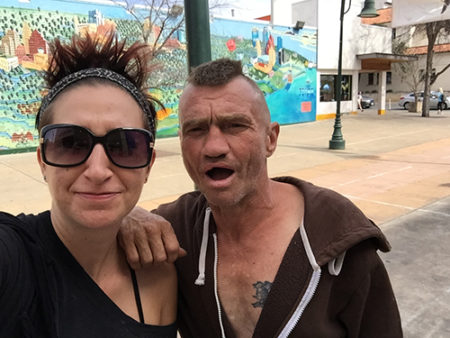A new film project, spearheaded by Director Lisa Donato, gives Austin’s homeless population a platform to share their stories.
 Tanya faces her final days at The Salvation Army, where she shares sleeping quarters and a bathroom with hundreds of other women. Each night, she dozes off to a symphony of fighting, crying and coughing while clutching her valuables and food to avoid theft. It’s not luxurious, but it’s also not the streets. In two weeks, her three months will expire. She needs to come up with $1,200 to secure housing or she will return to a pedestrian sidewalk on 23rd and Guadalupe streets.
Tanya faces her final days at The Salvation Army, where she shares sleeping quarters and a bathroom with hundreds of other women. Each night, she dozes off to a symphony of fighting, crying and coughing while clutching her valuables and food to avoid theft. It’s not luxurious, but it’s also not the streets. In two weeks, her three months will expire. She needs to come up with $1,200 to secure housing or she will return to a pedestrian sidewalk on 23rd and Guadalupe streets.
I’m one of the only people obliged to help. After all, she is my cousin-in-law. I’ve always prided myself on being altruistic. However, on that sweltering day in October 2015, I ignorantly assured my wife, Heather, that our guest bedroom was unavailable.
I first met Tanya at a wedding in 2009. Heather’s brother was getting married in Houston and this was the first time I was going to meet her entire family. From Denver, we flew to a concrete jungle of mental illnesses, staunch conservatism and quarter-sized mosquitos. I coped by losing myself in something creative, like amateur wedding photography.
“You’ve got great hair,” Tanya said.
I turned to face a radiant woman. We connected immediately. She owned a hair salon and struck me as the sanest person I met that weekend. I snapped her photo and left the wedding wanting to keep in touch with her.
But life resumed and we never spoke again. Six years later, Heather’s dad got sick. We made a hard decision to move to Texas to take care of him. Our first week in town, Heather reconnected with Tanya at a coffee shop. When Heather returned home, she was a mess.
“Tanya is homeless and needs a place to live,” she told me.
 What? I couldn’t believe it. There were dozens of people I could imagine this happening to, but not Tanya.
What? I couldn’t believe it. There were dozens of people I could imagine this happening to, but not Tanya.
We were the only family in Austin with an open room. Yet I felt uneasy about the situation. I felt unsafe and guarded. Was she an addict? Would she take advantage of the open invite and then never leave? I was exhausted by the amount of care that we expended on our situation. Still, would it really be that difficult to add one more person to our giving list?
I had dinner with Tanya a week later. As she talked, I was blown away by my obliviousness to homelessness. I learned that she had a series of misfortunate and expensive health events that forced her to live in her car and, eventually, on the streets. Because she didn’t qualify for rehab or have a physical or mental disability or an illness, she was unable to get shortlisted for low-income housing. She was on a wait list that could take up to two years to play out. After three months at The Salvation Army, she had to figure out where she was going to live in the remaining eight-to-20-month gap. She, like many others currently living on the streets, was stuck in a system loophole. She was considered too healthy to get governmental resources.
I had so many questions. For one, how did she eat? I learned that she carried a fanny pack of basic hairstyling supplies and groomed people on the streets, charging $5 to $10.
“Austin has the best-looking hobos in Texas,” Tanya once claimed.
Hobos? I had a visceral negative reaction to the word. And then I looked up its origin. The word “hobo” possibly derived from “homeward bound” or “hoe-boy,” and involved traveling workers returning from war. The word became derogatory in the Western U.S. due to skewed perceptions of homeless people. Suddenly, I was rapt by my biased unknowing. If open-minded me was uneducated and squirmy with this topic, how did others feel?
So, I decided to create Hobo Salon, a mobile salon that provides free haircuts to Austin’s homeless community while collecting their personal stories. Using a play on the word “salon,” our mission is to create a safe space for an invisible community to be seen, heard and groomed.
I collaborated with community activists Kate Proietti and Roni Chelben to experiment with the idea for the Cohen New Works Festival. Soon, we had a team of hairstylists hitting the streets to give free haircuts to homeless participants while we filmed participatory interviews.
What we’ve learned most through our research is that Tanya is not an anomaly. For people without support and resources, Tanya can be any of us. One act of kindness can change someone’s life in an instant. Our family ended up helping Tanya get back on track. She has been off the streets for almost a year now and can be found working full time as a hairstylist for Ulta Salon and part time for Hobo Salon.
To watch a trailer about the Hobo Salon film project, visit gofundme.com/hobosalon.


